Belgrano Athletic Club
Coordinates: 34°34′24.70″S 58°27′47.43″W / 34.5735278°S 58.4631750°W
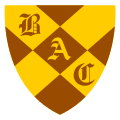 | |||
| Full name | Belgrano Athletic Club | ||
|---|---|---|---|
| Union | URBA | ||
| Nickname(s) | Marrón | ||
| Founded | 17 August 1896 [1] | ||
| Location | Belgrano, Buenos Aires, Argentina | ||
| Ground(s) | Virrey del Pino 3456 | ||
| Chairman | Alejandro Voltan[1] | ||
| Coach(es) | Francisco Gradín (h), Luis Gradín (h), Alejandro Conti, Guillermo Tramezzani | ||
| League(s) | Torneo de la URBA | ||
| 2016 | 2° of Top 14 (champion) [2] | ||
| |||
| Official website | |||
|
www | |||
Belgrano Athletic Club is an Argentine amateur sports club from Belgrano, Buenos Aires. One of Argentina's oldest institutions still in existence, Belgrano was one of the four clubs that founded the Argentine Rugby Union in 1899.[3] The senior team currently competes at Grupo I, the first division of Unión de Rugby de Buenos Aires.
Belgrano Athletic was one of the most prominent teams during the first years of football in Argentina, having won three domestic league titles, one national cup and two international cups. Belgrano's arch-rival during those years was Alumni, also from Belgrano neighborhood. Belgrano disaffiliated from the Argentine Association in late 1910s, focusing on rugby union and other sports. Association football is no longer practised at the club.
Belgrano's field hockey team currently takes part of Metropolitano championships organised by the Buenos Aires Hockey Association.
Apart from the sports detailed below, several activities are practised at the club nowadays, such as bowls, cricket, squash, swimming and tennis.[4]
Facilities
The club facilities are divided between two locations: its main building sited in Belgrano and another one located in Pilar. The facilities at Belgrano's headquarters include a regulation rugby union pitch, a field hockey pitch, twelve tennis courts, an olympic size swimming pool and an association football pitch. The facility in Pilar has three full size rugby pitches, six youth pitches another hockey pitch and another swimming pool.
History
The beginning: Football
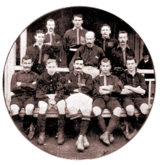
There are records of a football match played by the members of the "Club Inglés de Belgrano" in 1894, where Belgrano Athletic Club was officially founded on 17 August 1896.
Belgrano AC participated in the Primera División from 1896 to 1916. The squad won three league titles in 1899, 1904 and 1908, and also won a number of other tournaments including National cup Copa de Honor Cousenier in 1907 and international Tie Cup in 1900.
Belgrano Athletic played one of the earliest football rivalries against Belgrano neighbours Alumni, the most successful team of Argentine until its dissolution in 1911. Both teams were so strong that they won all of the thirteen league titles contested between 1899 and 1911 (that was the last year of Alumni football team competing in Argentine league, being officially dissolved in 1913).[5]
Belgrano AC would achieve a historic victory over River Plate, defeating the Millonario 10–1 in 1912. That was the worst defeat of River Plate in club's history.[6]
Despite of being one of the most notable football teams during the first years of that sport in Argentina, Belgrano was relegated from the Argentine Primera División, along with Quilmes in 1916.[7]
Belgrano never returned to the first division, and the club later disaffiliated from the Argentine Association, focusing on the practise of other sports, mainly rugby union.
Rugby union
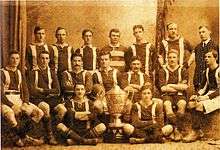
Belgrano Athletic rugby union team is one of the most successful teams in the Unión de Rugby de Buenos Aires, having won a total of 10 provincial titles.[8] In 1899, along with Buenos Aires FC, Lomas and Rosario AC, the club would become a founding member of the "River Plate Rugby Championship", the origin of today's Argentine Rugby Union.[3]
The first title obtained in rugby union was in 1907, playing 16 matches with 13 victories, 1 drew and only 2 lost. The team scored 233 points and only received 29 at the end of the tournament. That same year the club built the stadium's grandstands (commonly made of woods by the time) with a capacity of 600. In 1909 the Government of Argentina approved the statute (rules) of the club.[9] Its main rivals are Belgrano district's other big club, Alumni. In 2016, Belgrano won its 11° URBA championship after 48 years without league titles. Belgrnao defeated former champion Hindú at the final, played in San Isidro.[10][11]
Cricket
The first recorded cricket match held on the clubs cricket ground came when the Northern Suburbs and the Marylebone Cricket Club in 1912.[12] First-class cricket was first played there in 1927 when Argentina played the Marylebone Cricket Club. Five further first-class matches were played there, the last of which saw Argentina play Sir TEW Brinckman's XI in 1938.[13] Still in use to the present day, the ground held matches in the South American Championships and the Americas Championships in recent times, as well as hosting matches in the 2009 ICC World Cricket League Division Three.[12]
Uniform evolution
When the club was established, most of its members were employees of the Central Argentine Railway so they adopted the red, green and silver colors which were the railway company's colors. In 1919 the club changed to maroon (specifying "chocolate" tone according to the statute of that time) and gold as the railway had changed its colors before.[14]
Football 1896-19161 |
Rugby 1896-1919 |
Rugby 1919-today |
Notes:
- 1 A throwback jersey was worn as the away uniform during the 2011 season in commemoration of the 115th anniversary of the club.
Honours
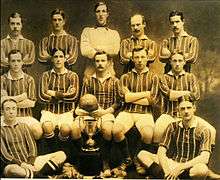
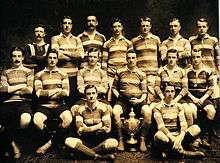
Cricket
- Primera División (38): 1902-03, 1905-06, 1906-07, 1907-08, 1908-09, 1910-11, 1911-12, 1914-15, 1918-19, 1923-24, 1925-26, 1926-27, 1928-29, 1929-30, 1931-32, 1932-33, 1953-54, 1954-55, 1955-56, 1958-59, 1961-62, 1965-66, 1967-68, 1968-69, 1969-70, 1970-71, 1973-74, 1974-75, 1980-81, 1981-82, 1983-84, 1984-85, 1988-89, 1989-90, 1991-92, 1997-98, 2001-02, 2005-06 [15]
Football
- Primera División (3): 1899, 1904, 1908 [16]
- Copa de Honor Municipalidad de Buenos Aires (1): 1907
- Tie Cup (1): 1900
- Copa de Honor Cousenier (1): 1907
Rugby union
- Torneo de la URBA (11): 1907, 1910, 1914, 1921, 1936, 1940, 1963, 1966, 1967, 1968, 2016
Field hockey
- Women's
- Metropolitano Primera División (4): 1942, 1946, 1949, 1974
Notable athletes
- Carlos Edgard Dickinson, former football captain that scored the first Argentina national football team goal ever in an official match. It was against Uruguay on 20 July 1902. Argentina won 6–0.[17][18]
- A.C. Addecott, former football captain during the amateur era.[19]
- Jeannette Campbell, silver medalist swimmer at the 1936 Olympics.
- Lisandro Arbizu, former rugby player for Los Pumas.
- Magdalena Aicega, former field hockey captain of Las Leonas.
- Rosario Luchetti, current field hockey player of Las Leonas.
References
- 1 2 Belgrano Athletic on URBA webpage
- ↑ Posiciones finales 2016 on URBA website
- 1 2 "Hechos históricos de la Unión" at UAR website
- ↑ Deportes – Belgrano AC official site Archived 18 April 2012 at the Wayback Machine.
- ↑ "Alumni: en el nombre del fútbol", Clarín, 2003-04-24
- ↑ "River Plate en la era amateur 1901–1930"
- ↑ "Asociacion Argentina de Football – 1916", RSSSF Archived 23 December 2011 at the Wayback Machine.
- ↑ Todos Los Campeones de La URBA (Spanish)
- ↑ "Belgrano y Alumni en sus comienzos"
- ↑ "Belgrano rompió el maleficio: tras 48 años es campeón del torneo de la URBA al vencer a Hindú", La Nación, 15 Oct 2016
- ↑ "Histórico: Belgrano Athletic venció a Hindú y vuelve a ser campeón tras 48 años", Minuto Uno, 15 Oct 2016
- 1 2 "Other matches played on Belgrano Athletic Club Ground, Buenos Aires". CricketArchive. Retrieved 22 October 2011.
- ↑ "First-Class Matches played on Belgrano Athletic Club Ground, Buenos Aires". CricketArchive. Retrieved 22 October 2011.
- ↑ "Hoy celebramos 115 años" – Belgrano AC official blog
- ↑ "Todos los campeones 1897-2010" at Argentine Cricket Association website
- ↑ Campeones del Fútbol Argentino on AFA website, 13 Jul 2015
- ↑ Colección 100 años de fútbol – Historia ilustrada del fútbol uruguayo, Franklin Morales
- ↑ Historia Del Fútbol Amateur En La Argentina, Jorge Iwanczuk (1992)
- ↑ "Belgrano y Alumni en sus comienzos"
External links
| Wikimedia Commons has media related to Belgrano Athletic Club. |